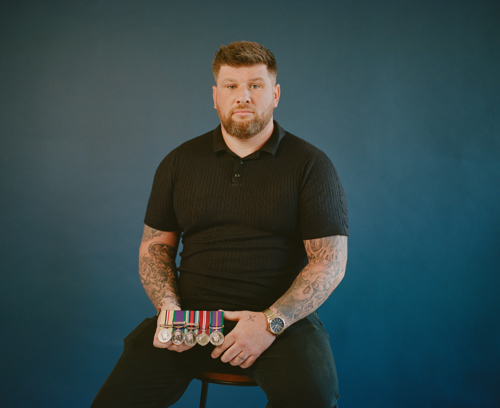
Veterans Mental Health Stigma
Find out more about the impact of stigma on veterans' mental health, and what you can do to help
On this page we have information on how stigma impacts veterans who are struggling with their mental health, and have tips on how you can help.
Veterans all over Scotland have said that not wanting people to know what they are going through, and worries about being seen as weak, stop veterans reaching out when they struggle with their mental health.
Self-stigma is a big issue highlighted by veterans, in that they do not want to consider themselves as weak, or admit they’re struggling, and just want to crack on.
All this information has come from veterans, based on their own personal experiences.
Why don’t veterans reach out
- From their time in the forces, veterans have been trained to show no signs that they have been struggling. They can often have an attitude of just crack on, keep moving forward.
- Veterans can see themselves as a failure for struggling, and that they are letting the side down if they reach out and ask for help.
- When serving, the environment encourages people to show no vulnerability, and this is something which remains with people, but when they leave the forces the support networks can go.
- A lack of conversations around veterans’ mental health means that people don’t understand what they are going through when they are struggling, or how to talk about it.
- Veterans can experience difficulties in adapting to civilian life, and worry that it will be even harder if they say they are struggling with their mental health.
- Veterans can experience stigma from civilians, saying things like, ‘You’ve been in a warzone, how can this be difficult?'
- The stereotype that veterans are all likely to have PTSD or other mental health problems can cause mental health stigma amongst veterans who do not want to conform to this stereotype, and therefore do not admit to mental health issues.

Why veterans should reach out
- Recovery can be fun, and help you enjoy life.
- Opening up and speaking about how you’re feeling can help you get closer to those around you.
- You are not alone - other people are experiencing the same as you, there is help out there, and people who won’t judge you.
- No matter your experience in the forces, if you’re struggling, that is justified, and doesn’t make you any less of a person.
- You can feel more like yourself again.

What to look out for:
Those close to a veteran will often notice something is wrong before they do. Friends and family can be key in helping a veteran to get help.
If you’re close to a veteran you might notice they stop socialising, stop going out, are not responding to texts. Or perhaps they are not excited by things they normally are, are more snappy, or perhaps they are drinking more.
If you are worried about someone, or you are a veteran and notice some of this applies to you, check out our tips below on how to start a conversation, and signposting for support.
Starting a conversation
Is now a good time?
Conversations may be face-to-face, on the phone or via text or email. Different things work for different people.
Time – consider whether or not you are both able to take this on right now. Give people the space to consider whether they can.
What if it’s not a good time? - It might not be a good a time to have the conversation but it is important that if you both can and want to, you identify a better time to chat.
It may be that you can’t have that conversation right now – you may not feel you are currently in the right headspace to talk to someone about how they are doing. Let them know you care but are unable to chat at the moment. You could help them to think of someone else they could talk to if you feel up to it.
Place – For some, it can be useful to find a quiet space with no distractions. Others may find it easier to talk while also doing some sort of activity like going for a walk or doing something creative.
What’s needed - It may be that someone needs the space to offload or vent; it could be that someone is seeking some support. Whatever someone needs, it’s important neither of you feel pressure to fix it or to have all of the answers.
How to Begin
If you've decided it’s a good time to have the conversation – sometimes it can be hard to know how to start. Here are a few ideas.
It’s okay - It’s okay to ask how someone is and ask them more than once. It might be hard for someone to open up about how they are feeling, asking twice shows the door is open.
Ways to ask if someone is okay – “How are you doing?” “How have you been feeling?” “I’m here if you want to chat.” “How’s everything going?”
Ways to let someone know you need to talk - “I’m not doing too well.” “I need to talk.” “It’s not easy to talk about it.” “I trust you.” “Do you have some time to chat?”
Listening and Responding
It can feel difficult to know the right things to say, but sometimes all someone needs is the space to be heard. Here are some tips
Listen without interruption – try to really hear what someone is saying about what they are going through. Try to allow them the space to share how they’re really feeling. You can show that you are listening through your body language.
Reflecting back and showing you care can help – For example, acknowledging that it seems like a difficult time for them. Sometimes we can try to make others feel better by being overly positive, but that might not be helpful to everyone. You can respond using their words to show you are listening.
You might get emotional – Hearing what someone is experiencing may bring up a lot of different emotions as a listener. It’s okay to feel these emotions but if you are able, try and judge whether showing them will be helpful to the other person.
Try not to minimise – Try not to minimise people's experience, or suggest things like 'everyone is feeling like this' or 'it could be worse'. You may say these types of things to try and make people feel like it's not that bad, with the intention of helping. But minimising people's experiences can make them feel like their issues aren't important, or worthy of sharing, which can make them worse as it can stop people from asking for help.
Responding - It’s okay to allow yourself time to process what they are saying and take your time to respond after they’ve shared. This might mean there are times of silence, and that’s okay. You might not know exactly what to say, but you can let them know you are genuinely interested in what they are telling you. You might find it helpful to ask some questions. Try to keep these open (not with a yes or no answer) to help them explore more about what’s going on for them.
If you suspect someone may be thinking about suicide, talk to them. Try to listen, be non-judgemental and do not criticise or blame the person. Letting them know you care, asking about their reasons for living and dying and really listening, trying to focus on their reasons for living in more detail can help. Asking direct questions like, “Do you have a plan?” or, “Are you thinking about suicide?" can help too. Asking about suicide can help the person talk about how they feel - it doesn’t make them more likely to attempt suicide.
Sharing your own experience – Sometimes it may be useful to share your experience of your own mental health. Try to do this sensitively so it doesn’t then become the focus of the conversation – offer if required in case it makes them feel like they aren’t in it alone. It might be worthwhile to check if the other person would find it helpful to hear your experience before sharing.
After a Conversation
Sometimes both of you may need some more support. This could be looking for external help or some time to reflect on the conversation and how you feel.
What would be helpful? - Asking what someone might need or find helpful next is a good question to ask. This might be about exploring support options together. You don’t need to have this information already – you can look for this together. It may be that they needed the space to talk about what they are feeling and experiencing and don’t need you to support with next steps.
If urgent help is needed - It may be that, through the conversation, you become concerned about the other person's wellbeing. This could include finding out if they have made a plan to take their own life. Asking about suicide won’t encourage someone to do it. If you feel that someone is at immediate risk call 999.
Reflecting –Take some time to check in with yourself after the conversation. How are you feeling? How do you think it went? Do you need some support?
What do you do next time you see them? - At the end of the conversation, it might be helpful for the other person to know that the “door is open” to speak another time. Depending on the relationship you have to that person, you may want to organise another time to chat if that is helpful but there shouldn’t be any pressure on either of you to do so.
The next time you see them, they may not want to talk about their mental health – be led by them.
Where to Get Help
Below are organisations that provide help and support to veterans
- Combat Stress - Combat Stress provide provide specialist treatment and support for veterans from every service and conflict, focusing on those with complex mental health issues related to their military service - combatstress.org.uk
- Veterans First Point - If you have served in the HM Armed Forces in any capacity for any length of time they can offer you free advice and support - veteransfirstpoint.org.uk
- Veterans Scotland - Veterans Scotland has information on a range of veterans organisations in Scotland - veteransscotland.co.uk
- Samaritans- Samaritans provides completely confidential emotional support face-to-face, via phone, email and letter, around the clock every day of the year, supporting people in emotional distress and vulnerable situations, including veterans, serving personnel, reservists and Service families, with mental health issues, relationship breakdown and suicidal thoughts. In the military and Armed Forces Community | How we can help (samaritans.org)
- Veterans UK - Veterans UK is part of the Ministry of Defence (MOD). They administer the Armed Forces Pension Schemes and compensation payments for those injured or bereaved through service. They also provide a package of free welfare and transition support for Service Personnel, Veterans and their families via a national Veterans Welfare Service, Defence Transition Services and a helpline facility. Veterans UK helpline: 0808 1914 2 18.
